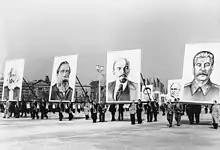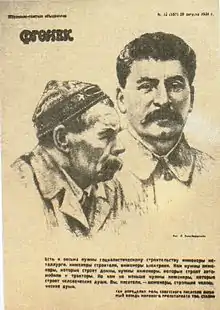Vozhd
Vozhd (Russian: Вождь, lit. 'leader, guide') is a Russian Church Slavonic loanword derived from the verb vesti (вести, meaning "to lead", "to guide").
In Serbia, it was the title Vožd (Serbian Cyrillic: Вожд) that was given to Karađorđe Petrović by all the voivodes who elected him to be their leader at their first Praviteljstvujusceg sovejeta (Governing State Council) during the First Serbian Uprising.
Later, in Russian, it was often used in reference to Soviet leaders such as Joseph Stalin or Lenin as Vozhd of the proletariat (Russian: Вождь пролетариата),[1] Vozhd of the Russian Communist Party (Russian: Вождь Российской Коммунистической Партии),[2][3] Vozhd of the World Revolution (Russian: Вождь мировой революции),[4] Vozhd of the Peoples (Russian: Вождь народов).[5]
In modern Russian, vozhd became exclusive for Communist leaders or leaders of aboriginal tribes. The word is becoming somewhat obsolete and is being replaced by its English version, "leader". In the German language, it is a counterpart to the word Führer.
After the East German cinema studio DEFA began mass-producing Red Western movies depicting the "Wild West" in the 18th and 19th centuries, the term vozhd became closely associated with tribal chiefs of Native Americans (such as Vozhd Beloye Pero, i. e. Chief White Feather.)
Vozhd also has connotations to "master" in the Russian language, from the days of serfdom.[6]
References
- The life of the Vozhd: how Lenin became the main revolutionary of the country (Жизнь вождя: как Ленин стал главным революционером страны). Mir 24. 2 November 2017
- Stalin, I. Lenin as organizer and vozhd of RCP (Ленин как организатор и вождь РКП). Marxist. December 2010
- Stalin, I. Lenin as organizer and vozhd of RCP (Ленин как организатор и вождь РКП). Leninism.
- https://www.ozon.ru/context/detail/id/8533897/
- Soviet vozhdi and their money (Советские вожди и их деньги). Russia House News
- Stalin, Court of the Red Tsar - Simon Sebag-Montefiore
External links
- Vozhdi CCCP at Savok.org

